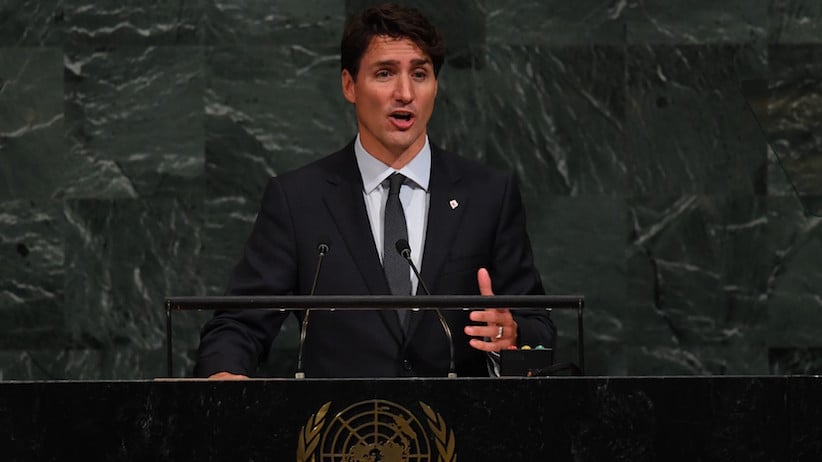Trudeau slips a challenge to Indigenous leaders
In his UN speech, the PM spoke mostly about what Ottawa’s doing, but he also called for Indigenous groups to rethink how they’re organized
Justin Trudeau, Prime Minister of Canada speaks during the 72nd session of the General Assembly at the United Nations in New York on September 21,2017. / AFP PHOTO / TIMOTHY A. CLARY (Photo credit should read TIMOTHY A. CLARY/AFP/Getty Images)
Share

The most intriguing part of Prime Minister Justin Trudeau’s speech on Indigenous issues to the United Nations General Assembly today wasn’t what he had to say about his own government’s approach, but his call for First Nations to reorganize themselves for a new era.
The way Trudeau framed the grim status quo was entirely familiar, but it never hurts to be reminded. “There are today children living on reserve in Canada who cannot safely drink, or bathe in, or even play in the water that comes out of their taps,” he said. “There are Indigenous parents who say goodnight to their children, and have to cross their fingers in the hopes that their kids won’t run away, or take their own lives in the night. Young Indigenous people in Canada struggle to get a good education.”
Nor was there anything surprising in the way he cast his government’s approach to making things better. He boasted of “dismantling the old colonial bureaucratic structures,” a reference mainly to his move, taken at the time of his recent cabinet shuffle, to split the Indigenous Affairs department in two, with one part responsible for the esoteric work of building up Indigenous “political, cultural, legal and economic institutions,” while the other—a new Department of Indigenous Services, headed by Jane Philpott, the former health minister—takes on the practical work of improving services like housing, education and water.
But then Trudeau touched—briefly but tellingly—on the other half of the relationship. If Ottawa is busy overhauling its institutions, what about First Nations, Inuit and Métis communities? “For Indigenous Peoples, it means taking a hard look at how they define and govern themselves as nations and governments, and how they seek to relate to other orders of government,” Trudeau said.
And he continued in that vein in a way that left no doubt that he doesn’t see the current array of Indigenous governments and organizations as sufficient to forging a better working relationship with Ottawa. “Indigenous peoples will decide how they wish to represent and organize themselves,” he said. “Some may choose to engage with our government based on historic nations and treaties, others will use different shared experiences as the basis for coming together. The choice is theirs.”
Uncertainty at the federal level about how best to interact with the range of possible partners among Indigenous groups is a longstanding source of frustration and even confusion. Back in early 2014, Shawn Atleo, then national chief of the Assembly of First Nations (AFN), negotiated what appeared to be a landmark deal with then-prime minister Stephen Harper on First Nations education. But major factions in the AFN rejected Atleo’s policy, which lead to his resignation and the collapse of the education agreement.
RELATED: How a new kind of resolution process can support reconciliation
If the AFN’s ability to represent hundreds of First Nations across the country at the national level is politically uncertain, the capacity of small First Nations to independently take on daunting new responsibilities at the local level is also often in doubt. This came up last June, when Trudeau was asked by reporters why his government wasn’t promptly turning over new funds to individual First Nations to improve child welfare services.
“In the history of the Canadian relationship, it’s been very rare that you had a government say to Indigenous communities, ‘What do you need?’ ” he told reporters. “‘We have money there, we’re ready to invest in you, you just need to tell us how you need it spent, where you’re going to spend it, and how you can best help.’ Well, a lot of Indigenous communities haven’t had the opportunity yet to take that responsibility, to actually think about how they can and must deliver [social services].”
Trudeau’s comments to the UN today about what he clearly sees as a pressing need for First Nations to rethink how they “represent and organize themselves” signals the importance he puts on parallel institutional reforms—not just how Ottawa approaches Indigenous people, but how Indigenous people approach Ottawa.